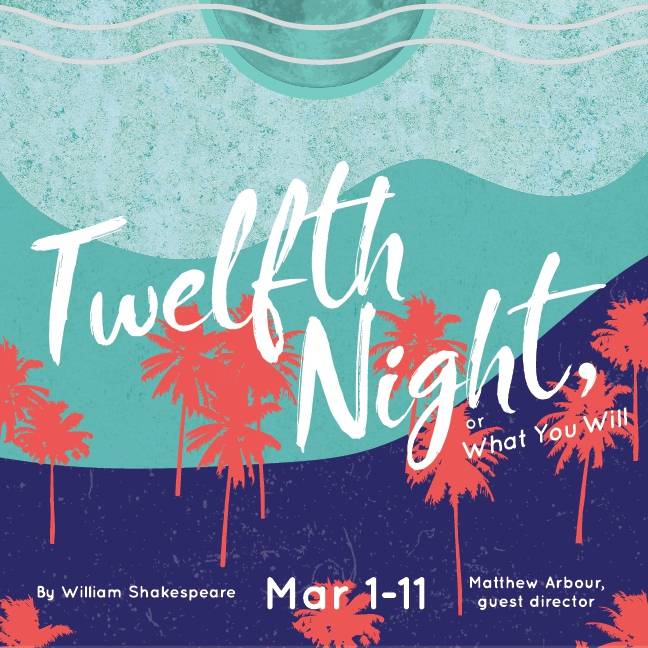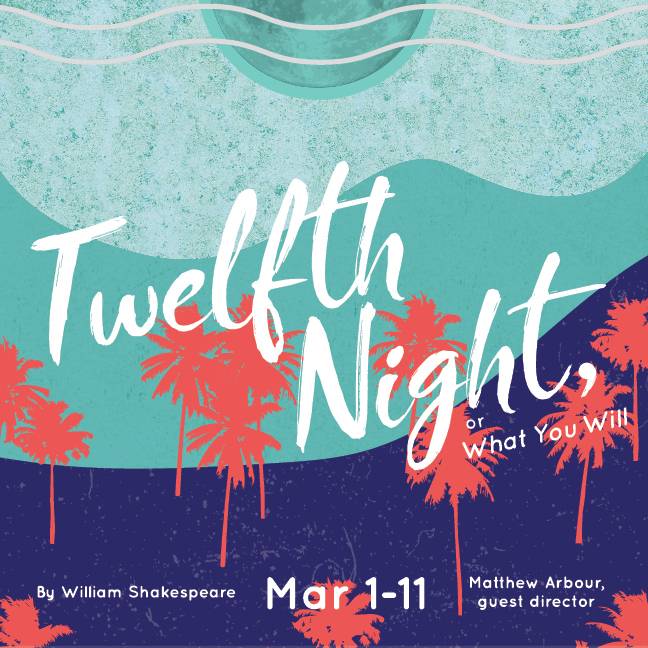Coming next to the Krannert Center for the Performing Arts is Illinois Theatre’s production of Shakespeare’s Twelfth Night, or What You Will directed by Matthew Arbour.
Washed upon the shore of an unfamiliar land, shipwrecked protagonist Viola (played by Ellen Magee) disguises herself as a man in order to work in the household of Duke Orsino (Christian Wilson). Hilarity ensues when Orsino’s love interest, the Lady Olivia (Alexandra Smith) falls in love with a man she believes to be named Cesario, who is truly Viola in disguise.
Twelfth Night, speculatively written in the first few years of the 1600s, provides a light air to Illinois Theatre’s season. Like many of Shakespeare’s plays, this romantic comedy has stood the test of time and has found itself rebirthed in a number of ways, such as the 2006 film She’s the Man starring Amanda Bynes as Viola.
I had the pleasure to chat with director Matthew Arbour about the production and what C-U audiences can expect from this unique and exciting rendition of Twelfth Night, or What You Will.

Smile Politely: As a director who has presented works all around the country, can you describe how you became involved with Illinois Theatre?
Matthew Arbour: Serendipity, happily. Like a lot of stories about how people came by this job or that job, I knew someone who knew someone who was looking for the right director for a particular project at a particular time. In this case, I happened to have worked with two wonderful actors over the years who are involved with Illinois Theatre and when a director for Twelfth Night was needed, they both thought to reach out to me and connect us. I knew of the program here from its excellent reputation, I happened to be available for the rehearsal period, and I love the play, so I threw my hat in the ring. I met with both Robin McFarquhar, head of acting, and then Kirsten Pullen, head of the department, to discuss the project and we really hit it off. It has been a terrific and collaborative process from that day forward.
SP: What has made your experience with this show differ from other Shakespeare works you have tackled? How does directing Twelfth Night, or What You Will differ from approaching a work such as Richard III?
Arbour: With a play like Richard III or Macbeth, the whole play is driven by the story and actions of its title character and so you can really hang your hat on what that person is doing from beginning to end to tell the story. With Twelfth Night, the subject of the play is much more thematic — in this case, vitality, a passion for life in the face of sorrow. Viola is central, of course, to the plot, but the plot doesn’t deliver the heart of the play. So, as a director, you’re working much more on making the various puzzle pieces resonate together to reveal the heart of the story. It’s much more like a mosaic with all of the pieces coming together to embellish and elaborate on some very powerful themes. So, it’s an ensemble piece in the end and directing it calls for attention to how all of the pieces accumulate into the telling of the story.
SP: Though we often refer to this play as Twelfth Night, there is the alternate title What You Will attached to the name. What does this alternate title mean to you, and has it influenced your vision for this production?
Arbour: What You Will reminds me of the spirit of the Festival of Twelfth Night. In England, Twelfth Night — or the Feast of the Epiphany — marks the end of the Christmas season of celebration and is the large and raucous event where the social order is overturned for one night, similar to the way Mardi Gras overturns the social order to kick off the festival season of Lent in New Orleans. What You Will has really been what has kept me loose and open to the freewheeling, musical and emotional aspects of this play.
SP: Recently it has been popular to take Shakespeare’s works out of original context and bring new meaning and accessibility to the work by modernizing it. Is this something you have ventured into within this production? Or are you keeping it true to Shakespeare’s denoted time and place?
Arbour: I don’t think of Twelfth Night as an especially time-and-place specific play as Shakespeare plays go— Shakespeare places Twelfth Night in the fictional country of Illyria and doesn’t note a particular time. As we put together this show, we always said that our Illyria wasn’t going to be a real place in the sense that you could buy a plane ticket and go visit, it wasn’t ever going to be that literal, but at the same time, we were drawn to places where Carnival and the Festival of Twelfth Night are still actively celebrated, by places where the Old World and the New World meet and mix culturally, by places where a catastrophic storm could wash you up on a bewildering shore, and by places where revelry and music and passion are the beating heart of the theatrical world. So, our production imagines Illyria as a fictional tropical coastal place that draws on imagery of late 19th century New Orleans, old Havana and a variety of Caribbean settings. The sort of place where life is abundant and irrepressible. Where if you leave something outside too long, the rains soak it, vines overtake it and flowers burst out of it.
SP: What audiences would you like to reach with this play?
Arbour: I always want to reach an audience that might be intimidated or maybe not confident that they can spend two hours with Shakespeare and get it — they can and they will!
__________________________________________________________________________
Shakespeare’s Twelfth Night, or What You Will, directed by Matthew Arbour, will be presented in the Colwell Playhouse at the Krannert Center for the Performing Arts March 1-3 and March 8-10 at 7:30 p.m. and March 11th at 3:00 p.m. There will be a talkback following the performance on March 8th. For more information, click here.








